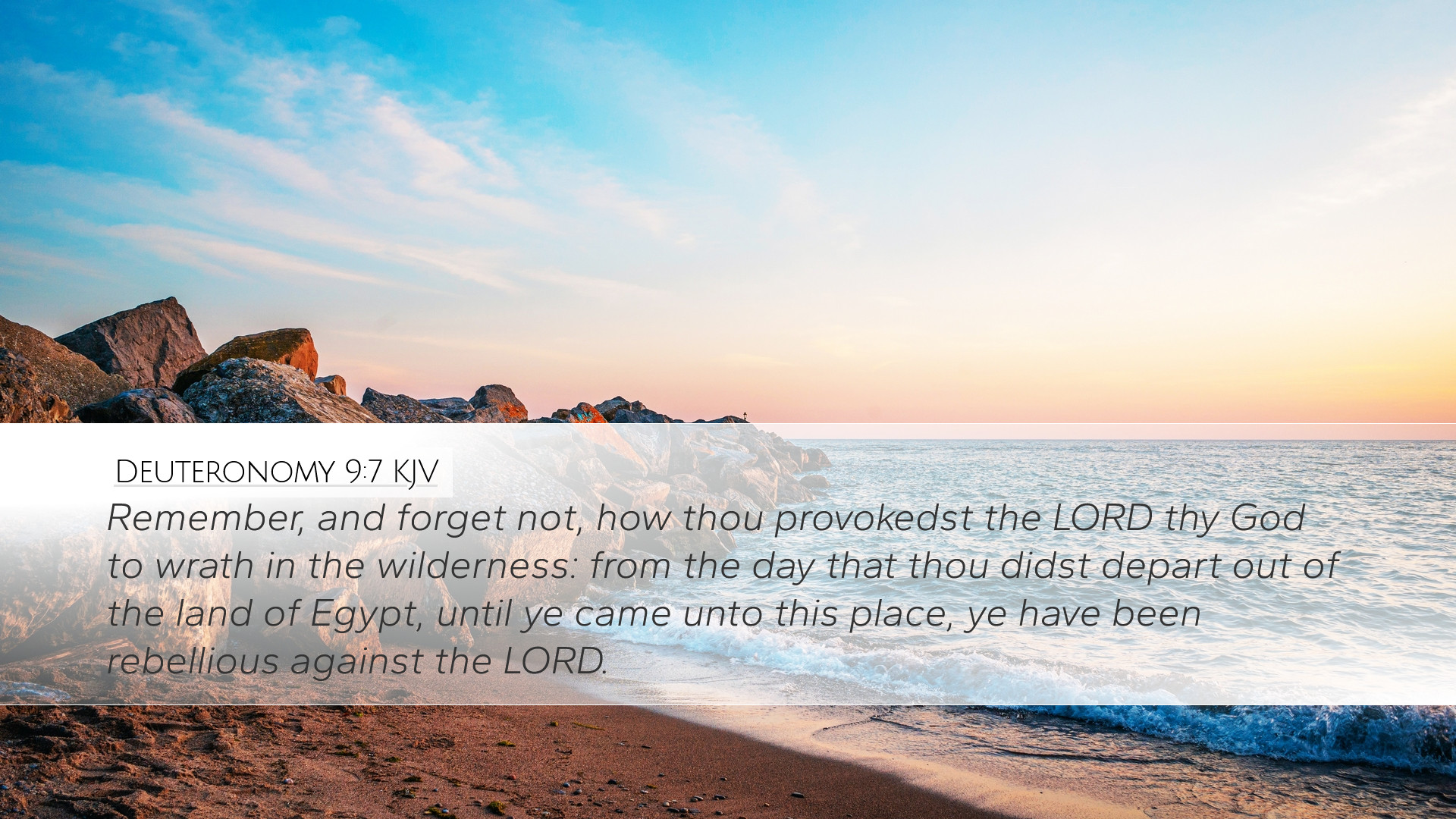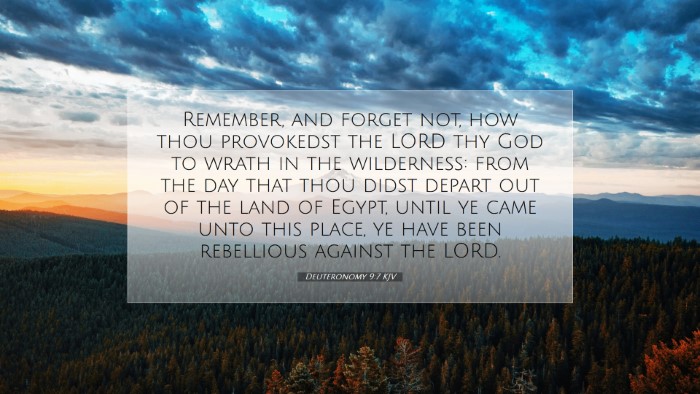Commentary on Deuteronomy 9:7
Verse: "Remember, and forget not, how thou provokedst the LORD thy God to wrath in the wilderness: from the day that thou didst depart out of the land of Egypt, until ye came unto this place, ye have been rebellious against the LORD."
Introduction
This verse serves as a stark reminder of the Israelites' history of rebellion against God. It calls attention to their propensity to forget God's mercy and grace during their journey. In understanding this passage, we can draw from the insights of various public domain commentators to enrich our interpretations and applications.
1. The Call to Remember
Matthew Henry emphasizes the importance of memory in a spiritual context, pointing out that the act of remembering God's past deeds is crucial for maintaining faith. He notes that "to remember is to return to the foundational truths that establish our faith." This imperative to remember is a theme woven throughout Scripture, highlighting the human tendency to forget.
Albert Barnes also underlines that the phrase "forget not" serves as a direct admonition. The Israelites are urged to recall their ungrateful attitude and the consequences it brought about. According to Barnes, "Forgotten benefits lead to ungratefulness and repetitive cycles of sin." Thus, this verse acts as a historical reflection meant to warn future generations of the consequences of rebellion against God.
2. The Wilderness Experience
Adam Clarke provides deep insight into the significance of the wilderness as a formative time for Israel. He argues that the wilderness experience was not merely a period of physical wandering but a time of spiritual testing and maturation. Clarke notes, "The wilderness was a stage of preparation for what lay ahead, yet it also exposed the people's lack of faith." The trials faced during this time, including hunger, thirst, and enemy encounters, were tests that revealed Israel's faithfulness or lack thereof.
3. The Nature of Rebellion
Both Matthew Henry and Albert Barnes draw attention to the specific nature of Israel's rebellion. Henry categorizes their rebellion into overt acts of disobedience, such as idolatry and lack of faith, and notes that these actions often provoked God’s anger. Barnes expands on this by reflecting on how the people continually turned their back on God despite His consistent deliverance. He states, "Rebellion is not just an act of defiance; it is a conscious failure to remember the goodness of the Lord." This presents a significant theological reflection on the nature of sin and the importance of intentional remembrance.
4. Theological Implications
This verse has profound implications for modern readers, especially for pastors and theologians. It serves as a reminder that the forgetfulness exhibited by the Israelites can manifest in contemporary Christian life. Matthew Henry asserts, "Believers today must guard against the same spirit of forgetfulness that plagued Israel." This leads to a broader discussion of communal memory and the importance of teaching and propagating the narrative of God's faithfulness.
Correlating this with the New Testament, we see parallels in Romans 15:4, which emphasizes the importance of remembering the Scriptures so that believers might have hope. The act of remembering highlights God's faithfulness and remains integral to our faith experience.
5. Practical Applications
- Historical Reflection: It is essential for communities of faith to engage in remembering their histories both corporately and individually. This can be done through storytelling, testimonies, and communal worship.
- Disciplines of Memory: Pastors are encouraged to incorporate practices that aid memory, such as liturgy, hymns, and Bible memorization, to reinforce the narrative of God's faithfulness.
- Addressing Rebellion: The call to remember also involves acknowledging present-day rebellions and addressing them through repentance and faith renewal. Acknowledging where we stray allows for genuine reconciliation and growth.
Conclusion
Deuteronomy 9:7 stands as a poignant reminder that the act of remembering is foundational to the life of faith. Through the insights of Matthew Henry, Albert Barnes, and Adam Clarke, we understand the importance of memory in avoiding destructive rebellion against God. For pastors, students, theologians, and Bible scholars, this verse calls for reflection not only on the historical context of Israel's journey but also on the continuous need to remember God's mercies in our own spiritual journeys.


